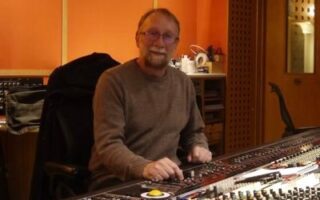
The Extraordinary Journey of Jason Miles
A Musical Biography
Jason Miles has been behind some iconic recordings. He is in the process of releasing his book, and it promises to be as iconic as some of the musicians he has worked with. I was privileged to see a copy a few weeks back and I can reveal the book is as stuffed with stars, labels, prestigious addresses, wonderful anecdotes, and intimate details as possible, yet, as Jason has proved before, there is never a cross word, never a derogatory description of musicians or person – instead Jason finds ways to explain poor behaviour and take a charitable view of his fellow musicians. Not that the book is about disagreement – it is about the background of creating albums, tours, shows and the interaction between musicians and producers.
“The Extraordinary Journey Of Jason Miles – A Musical Biography” is littered with names – Marcus Miller, Miles Davis, Tom Harrell, Luther Vandross, Chaka Khan, David Sanborn, Bob Berg and many more. With each familiar name comes stories of working together, late-night meetings in studios ranging from tiny lofts to huge corporate rooms with technology bursting out of the seams. Bands like the Butterfield Blues Band, Jamaica Boys, albums including “Amandla”( Warner 1989), Tutu(Warner 1986), Emmy nominations, the book reads like a musical who’s who. Jason Miles is a born storyteller, and at times, you feel you are in the room as he tells of discussions, amusing asides, relationships as they change and grow. Yet, some relationships remain throughout, like his with Marcus Miller, Luther Vandross, and, until his death, Miles Davis.
Jason has managed to do something few producers do – work with the best and maintain a successful solo career.
It is a cliche, I know, but the book is bursting with detail, people, and incredible stories, from the pen of one who was right there.
I asked Jason for an interview.
SS- Sammy
JM – Jason
SS – Jason, can you tell me what prompted you to release and fund the book yourself?
JM – I am a first-time author. No matter how interesting and compelling my story is, not many publishing houses will be interested. To get them interested, you also need a literary agent. I spent time looking for one but couldn’t even get a return phone call or email. My friend, Jo Gelbard, who wrote her book “A Love Story in Blue” ( AuthorHouse 2012) about her relationship with Miles Davis, encouraged me to self-publish. She encouraged me to reach out to many journalists and critics who knew me and have them read the book and endorse it if they liked it. That was the first great idea I heard. If a publisher puts it out, it’s almost like a record company releasing an album. They work on your project for a while, and then if it’s not taking hold, they abandon it and go on to the next. This book has got too much of my life in it and too much of my time in it for me to just watch it slip through the cracks like many records do. I decided that I would do a pre-sale of the book and use the quotes from journalists to get people interested. Then I could have a company put it all together, get books printed and get a publicist. Hopefully, I will be able to go out and play shows and sell it in digital and hardcopy format. I would also be into doing readings and whatever it takes to get the word out there about the book. I’m happy to say that I sold 115 books in the pre-sale. So it’s onwards and upwards, because this is a long-term project, and if it works, I have another book inside me to do.
This, however, is a deep story, and getting Marcus Miller to do the foreword and reflect on our time together really got me confident that I know I’m onto something
SS: I understand you are moving to Portugal. What prompted this? Are you excited?
JM: It’s time for a new adventure. Many people and friends have always felt that I’ve been a bit underappreciated here in the United States. Sometimes I have felt like that, but I always look past things to keep moving into the future because I know what I’m capable of and what I’ve delivered in the past. I’ve been following what’s going on in Portugal for a while. I’ve had friends that lived there; they just loved it. It is a great gateway into Europe, and I have some very good business people that I work with in Brussels. I also feel my voice will be heard in Europe. I’ve toured over there and always enjoyed the audience and the response to the music. Kathy and I spent almost a month recently in Portugal, and it reaffirmed that we genuinely love the vibe and the people who are just so kind and welcoming.
Moving is a real task; there is no doubt, but I don’t think life is about sitting still. It’s about finding new places and being inspired to write new music. I also want to spread the word about what it takes to have a life in music in the music world. I’m also looking to spend as much time as possible in a beautiful place with my wife. We’ve navigated this life together, and I’m not gonna just sit down and watch time go by.
When I saw Herbie Hancock a few years ago before the pandemic, I marvelled at how amazing he played as he was about to turn 80, and his basic message to me was “Stop Counting.”
SS: In the book are unique insights, and you have worked with musicians we might call legends. Without thinking about it, who had the most profound effect on you and why?
JM: Well, of course, it was Miles Davis. I came back to New York City in 1974 from the Midwest with my primary goal to one day work with him. Yes, it took 12 years, but what I learned will stay with me for a lifetime and has already. That is part of my conundrum. Miles told me to keep on probing and discovering the music and not being scared to go and put it out there. It has led me to find my own lane in life, and sometimes that isn’t easy to navigate because not everybody’s willing to let you be in your own lane. It can be a lonely existence.
Miles was always incredibly encouraging to me, and I believe he saw my potential and helped me achieve this. The times we spent together and many times in his apartment were enlightening and inspiring. I mean, I loved working with Luther Van Dross and Marcus Miller. Spending so much time with them, I learned a lot, but having Miles and someone like Joe Sample available to talk and help me find my way is indescribable.
SS: What advice would you offer to a young person considering going into the music industry?
JM: Understand that the arrow doesn’t always point straight up. It is a long slog. These days it is even more difficult for young artists to get traction. The days of great recording sessions and making a living as a studio guy or being on the road is much more difficult these days and you really have got to have a stomach and a heart to absorb it all. I would say that you’re going to have to be prepared to find other ways to make a living for a while and keep pursuing your life and music.
I would also say this. Don’t discount folks that are older than you. There is a lot to learn from people of experience. You can’t learn from yourself – it is impossible. You can make mistakes, and, hopefully, you don’t make them twice, but you have to understand that everything is like a marathon. It keeps going, and you hope you can grow along with it. I try to lead young people in the right direction and help them avoid the minefields. Guess what? Most of the time, they go into the minefield and then wonder what they did wrong and why it’s taking time to recover.
I’m trying to make it so they don’t have to go through all of the heartache and disappointment that comes with life as an artist. Also, you will learn many things in school if you go and study music. The one thing you won’t learn is how to truly be a musician. That is a whole other story and one that I found out that wasn’t very cut and dry. You need street smarts, and you can’t learn that in a classroom
SS: Was there any particular event, gig, concert, or release where you felt you had truly achieved your ambitions? A time when you said to yourself, ‘yes, This is what I wanted’?
JM: I don’t think it’s one particular moment. Yes, when I walked into the studio and worked with Miles Davis for the first time, I thought, “Wow! This is it!” I was to realize it was just one step, and there needs to be another step and another step after that. Going to Montserrat with Luther Vandross to work at Air Studios was also a big moment because the truly elite recorded there. Making the album “A Love Affair – the music of Ivan Lins ( Telarc 2000) “ and having it take eight years to get off the ground, then to see all these great artists come on board and to finally end up with a Grammy and another nomination for the album truly was a moment of great satisfaction as well.
Travelling and playing at some wonderful festivals worldwide also gave me that feeling of accomplishment, which reached a high point when I walked on stage at the Hollywood Bowl to perform my show “To Grover with Love,” opening for George Benson in front of 17,000 people. So as you see, it’s never just one thing. After that one beautiful thing happens, you want the story to continue, and that’s what I’m trying to do now.
SS: Jason, one final question. How does it feel to be an author? How was it putting everything down and working with an editor? A very different process to producing music.
JM: When you write a book, like making an album, you read it back and say, “this is it. I know this is all there, and I love how it is”. That’s when you gotta take a step back And say to yourself, ” just like making a record, every great artist needs a great producer.” Because it’s so hard to be objective about yourself. I listened to a few writer friends who told me that I need to work with an editor that will really put the book in the condition it needs to be. You need to understand that you always listen to people that know more than you do, and that was the right advice. I turned the book over to Jeff Tamarkin, a friend and one hell of a writer. When we went to Europe for six weeks, I told him, “do what you need to do to keep my vision, yet make the book the best it can be.” He did not disappoint, and after I started reading it, I saw that there was no way I could have put this out in the condition that it was before. Not that it was terrible, but there was excess and things that could be trimmed. When he wrote his book on the Jefferson airplane, Jeff told me it was like 800 pages; then it got whittled down to 300 pages. I totally got it.
So, I would love to work with a great editor again because I see the value. You have to put your ego aside for the better of the project.
It is strange for me because back in June 2021 I was answering queries from Jason regarding publishing, copy editors, connections, etc. After one discussion, Jason told me, ” We just read your corrections or suggestions, and I think it’s really great, and so does my wife, Kathy. I will be implementing them immediately. You are more than welcome to comment on the chapter, and, of course, I have another 15 of them!” We then got sidetracked as I reviewed a singer Jason was helping but for me, it is so pleasing to see the book come to fruition and Jason Miles, a hard-working musician, producer, and now writer, getting his time in the full glare of the limelight. The book is incredible – a revelation not just of the music industry but also of Miles himself.
Producer | Jason Miles | United States (jasonmilesmusic.com)



